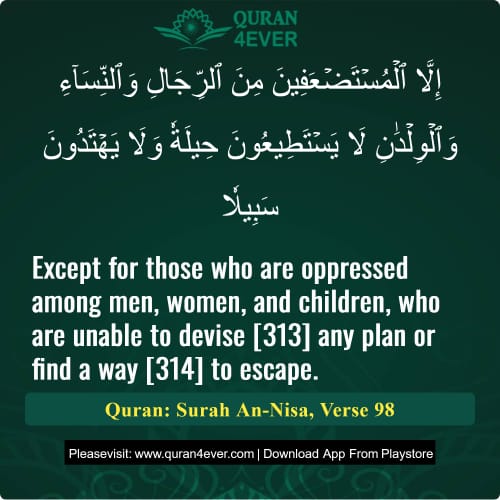
Transliteration:( Illal mustad 'afeena minar rijaali wannisaaa'i walwildaani laa yastatee'oona heelatanw wa laa yahtadoona sabeela )
“Except for those who are oppressed among men, women, and children, who are unable to devise [313] any plan or find a way [314] to escape.”
The word “oppressed” refers to those who are truly incapable of migrating—due to genuine disability, coercion, or imprisonment.
A prime example is Hazrat Abbas (Radiallahu Anhu), who was forced to accompany the army of the disbelievers in the Battle of Badr.
Because of this, the Holy Prophet ﷺ instructed the Muslims not to kill him, as:
He had not joined the battle of his own free will,
but had been compelled by the Quraysh to be part of their ranks.
This shows the Islamic principle of judging actions by intentions and circumstances.
This part of the verse clarifies that:
Those who cannot migrate due to lack of knowledge, no access to escape routes, or physical constraints are exempt from blame.
Thus, if a person:
Doesn’t know the path to Muslim lands, or
Is too weak, ill, or trapped,
they are considered excusable under Shari‘ah.
Such individuals are not included in the condemnation mentioned in the previous verse, as their circumstances leave them no choice.
The tafsir of Surah Nisa verse 98 by Ibn Kathir is unavailable here.
Please refer to Surah Nisa ayat 97 which provides the complete commentary from verse 97 through 100.
(4:98) except the men, women, and children who were indeed too feeble to be able to seek the means of escape and did not know where to go .-
There is no commentary by Abul Maududi available for this verse.
[213]- They are prevented by circumstances beyond their control.

For a faster and smoother experience,
install our mobile app now.
Related Ayat(Verses)/Topics